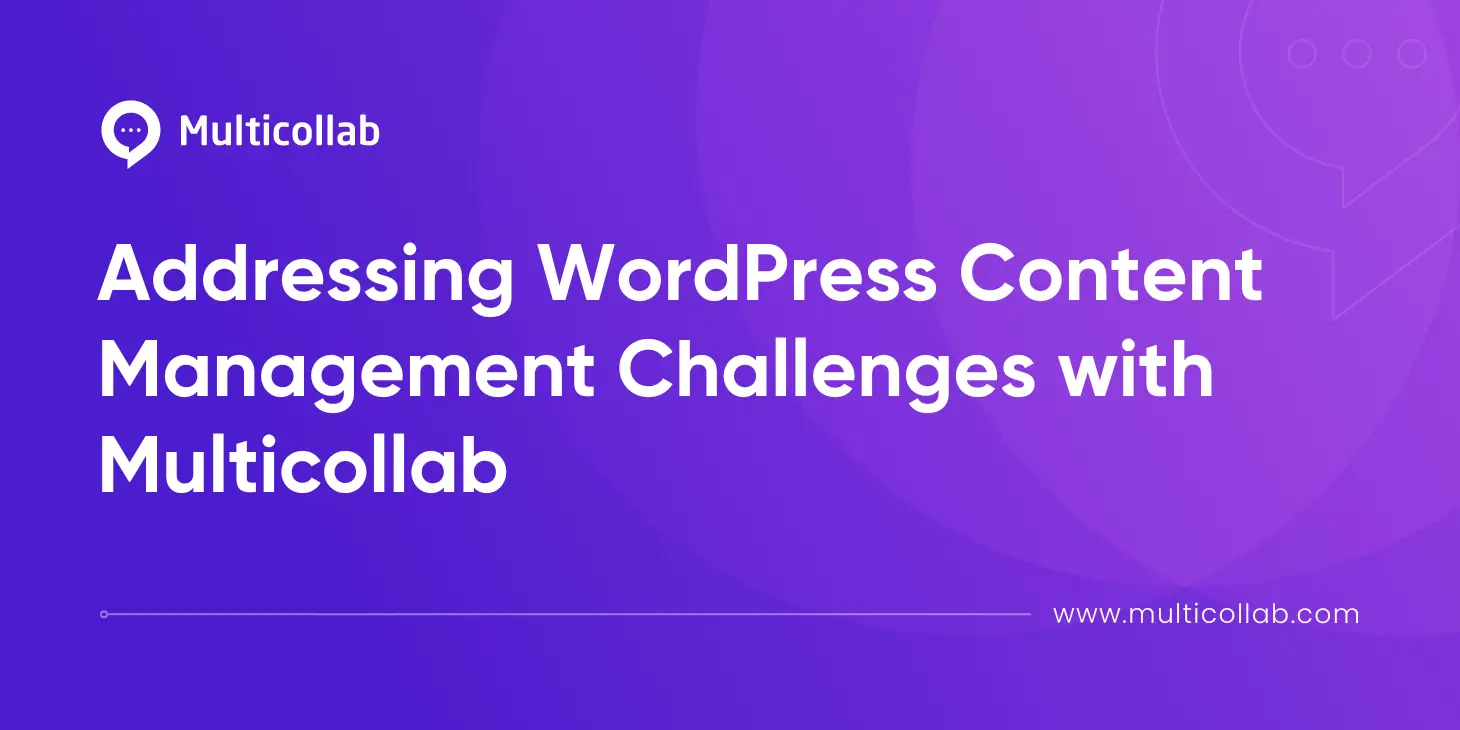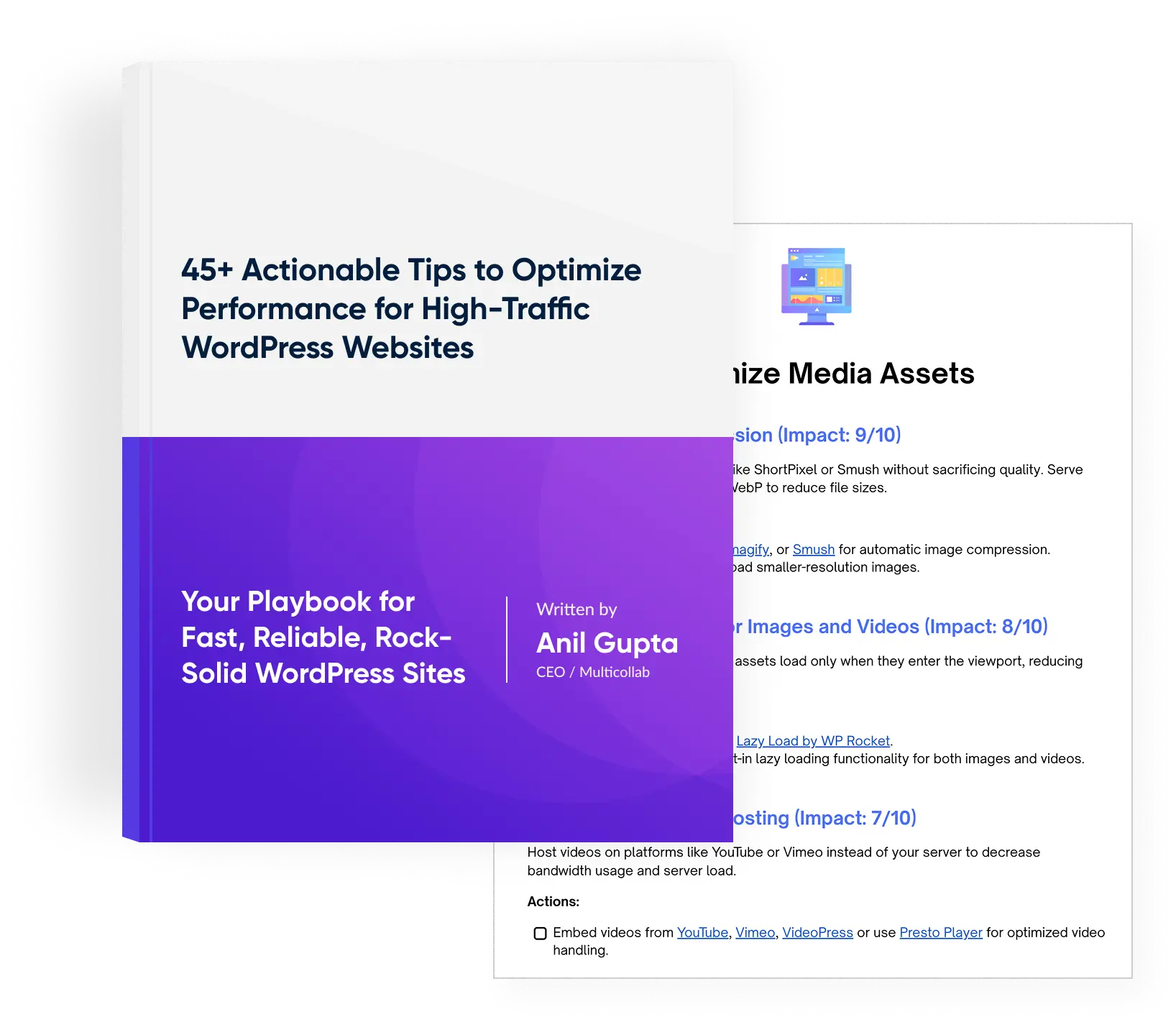Table of Contents
Content teams are frequently met with a range of challenges that can affect their productivity and efficiency.
Coordinating multiple contributors and ensuring content accuracy and consistency can be challenging. Additionally, managing feedback, edits, and permissions can become overwhelming without the right tools and strategies.
In this blog post, we’ll explore how WordPress content teams can overcome these challenges to create exceptional content, ensuring a seamless WordPress content management experience.
Common Content Management Challenges in WordPress
Content management in WordPress comes with its own set of hurdles. Here are some of the most prevalent challenges faced by content teams:
Inefficient Collaboration: Coordinating content creation and editing across a team can be difficult, leading to delays and miscommunications. With multiple team members working on different aspects of content, it can be hard to ensure everyone is on the same page. This lack of coordination can result in duplicated efforts, missed deadlines, and a final product that lacks cohesion.
Poor Workflow Management: Without a structured workflow, tasks can slip through the cracks, resulting in missed deadlines and incomplete projects. Content teams need clear processes for drafting, reviewing, and publishing content to ensure timely and consistent output. However, many teams struggle with defining and sticking to such workflows, leading to inefficiencies.
Lack of Real-Time Feedback: Waiting for feedback and approvals can slow down the content production process significantly. When team members have to wait for feedback via email or other asynchronous methods, it can create delays that hamper productivity. Real-time feedback is crucial for maintaining momentum and ensuring that content meets quality standards.
Document and Feedback Overload: Managing numerous documents and feedback threads can be overwhelming and lead to errors. Content teams often juggle multiple drafts, revisions, and feedback from various stakeholders. Without a centralized system for managing these inputs, it’s easy for important comments to get lost or for team members to become confused about which version of a document they should be working on.
Security and Permissions Issues: Ensuring that only authorized team members can make changes is crucial to maintaining content integrity. Inadequate permission settings can lead to unauthorized edits, accidental deletions, and other security risks. Content teams need robust permissions management to safeguard their work and ensure that only approved changes are made.
Furthermore, many WordPress content teams often commit these common mistakes which should be avoided at all costs:
- Scattered feedback can lead to confusion and overlooked suggestions.
- Without real-time collaboration, team members may have to wait for others to finish their work before they can start, leading to unnecessary downtime.
- When edits are made without proper version control, it can be difficult to review changes, revert to previous versions, or understand the evolution of a document.
How Multicollab’s Features Address Content Management Challenges
Imagine a WordPress content team working for a global marketing agency. This team is responsible for producing high-quality blog posts, case studies, and other digital content for various clients. The team faces several content management challenges, including coordinating contributions from writers in different time zones, ensuring the accuracy and consistency of content, and managing feedback and edits efficiently.
Real-Time Collaboration
Challenge: The team often struggles with multiple versions of documents and time lags in receiving feedback, causing delays in the content creation process.
Solution: Multicollab’s real-time collaboration feature allows multiple users to edit content together simultaneously. For instance, a writer in New York and an editor in London can work on the same document at the same time, making changes and providing feedback instantly. This feature streamlines the creation process, ensuring timely completion of projects without the confusion of multiple document versions.
Inline Comment in WordPress Draft
Challenge: Feedback is often scattered across emails and messaging platforms, leading to miscommunication and overlooked comments.
Solution: Multicollab enables users to add comments directly to text or media within the WordPress draft. For example, a content strategist can highlight a section of text and leave specific suggestions or questions. This centralizes feedback, making it clear and easy to address, thus avoiding the confusion of scattered feedback.
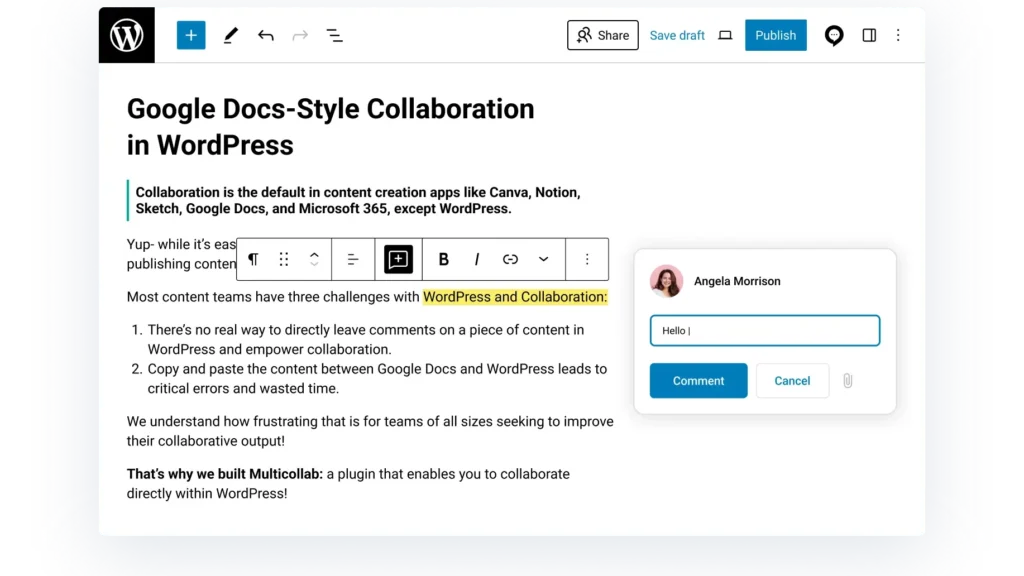
Suggestion Mode
Challenge: Maintaining content integrity while incorporating feedback and edits can be difficult, especially with multiple contributors.
Solution: Multicollab’s Suggestion Mode highlights changes for easy review, allowing team members to accept or reject edits. For instance, when a senior editor reviews a draft, they can make suggestions that the original author can either accept or reject, ensuring that all modifications are collaborative and the content remains cohesive.
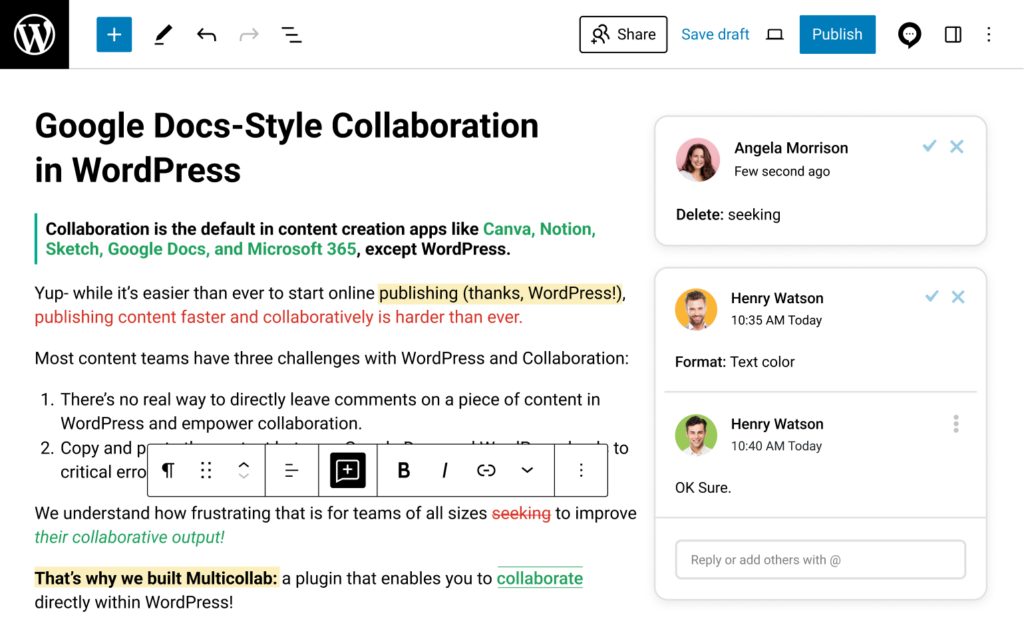
Team Collaboration
Challenge: Keeping communication organized and within the context of the document is challenging, often leading to fragmented discussions.
Solution: Multicollab facilitates team collaboration with reply, resolve, and mention options directly in the dashboard. For example, during the review process, a team member can mention another colleague to get their input on a specific section, ensuring that all communication is streamlined and relevant to the content at hand.
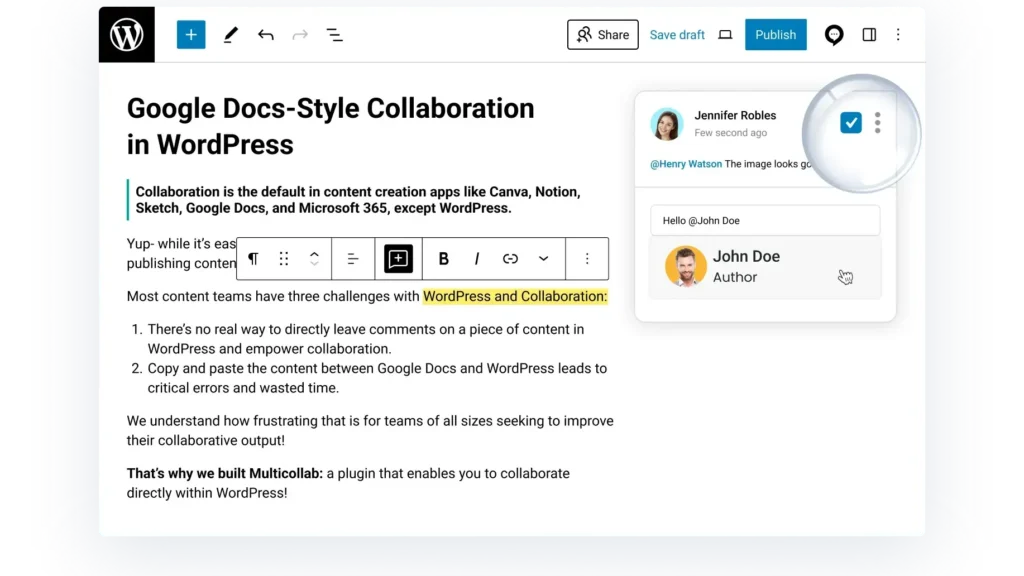
Email and Slack Notifications
Challenge: Team members often miss important updates, causing delays in the collaboration process.
Solution: Multicollab provides email and Slack notifications for comments, mentions, and other activities. This ensures that team members are instantly updated and can quickly respond to feedback. For instance, if an editor leaves a comment on a draft, the writer will receive a notification and can address it promptly.
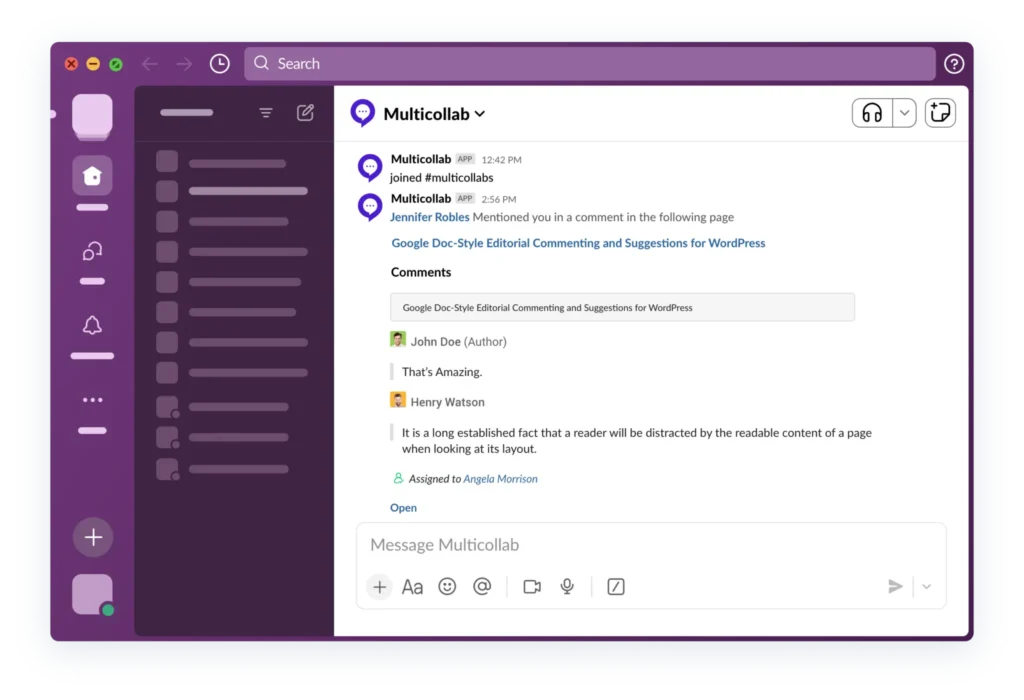
Guest Collaboration
Challenge: Engaging external stakeholders without giving them full access to the WordPress account is cumbersome.
Solution: Multicollab allows external collaborators to comment or view content without needing a WordPress account. For example, a client can review a draft and provide comments directly within the document, streamlining stakeholder engagement and ensuring their feedback is incorporated efficiently.
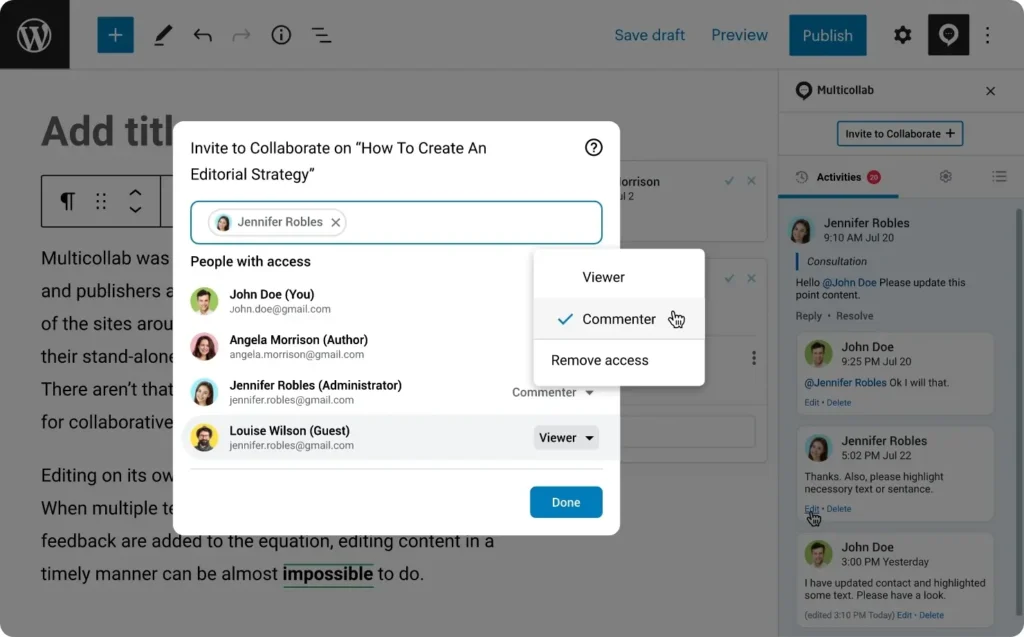
Attach Document to Comment
Challenge: Providing additional context and references often requires separate communications, leading to fragmented information.
Solution: Multicollab lets users add documents or images to comments, enhancing clarity and context. For example, if a designer needs to provide a visual reference, they can attach an image directly to their comment, making it easier for the writer to understand and implement the feedback.
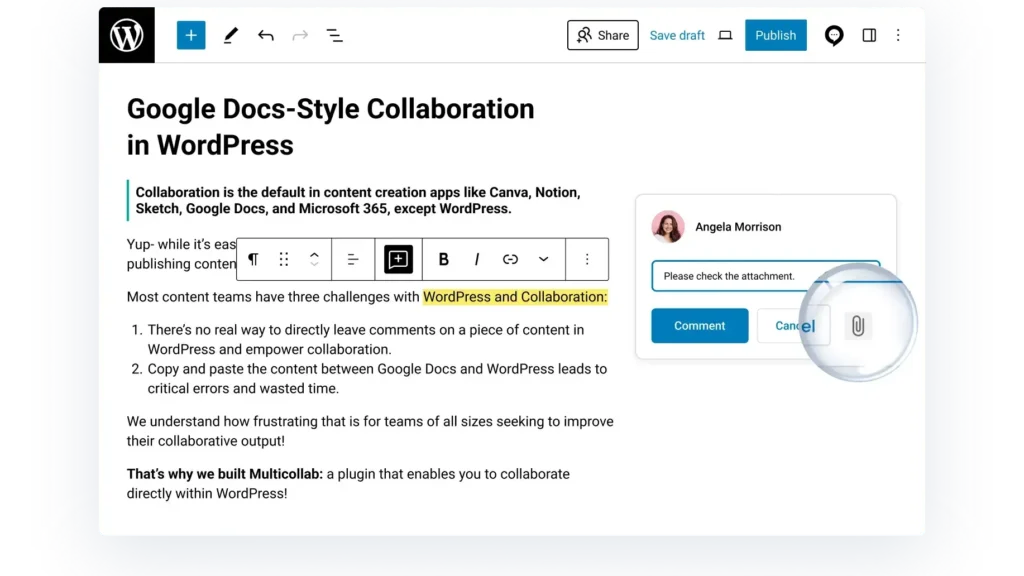
Reports and Activity
Challenge: Monitoring collaboration and tracking progress is difficult, leading to a lack of transparency in the editorial workflow.
Solution: Multicollab offers a detailed activity timeline and reporting features. This allows team leads to monitor collaboration efforts and track the progress of each project. For example, they can see who made specific changes and when, ensuring that the workflow is transparent and efficient.
Custom Permissions
Challenge: Ensuring content security and control over who can manage comments and suggestions is critical but challenging.
Solution: Multicollab allows configuration of custom permissions, ensuring that only authorized users can manage comments and suggestions. For instance, only senior editors can approve or reject suggestions, maintaining the integrity and security of the content.
Conclusion
Effective content management is essential for WordPress content teams to maintain productivity, consistency, and quality. Coordinating multiple contributors, managing workflows, and handling feedback can be challenging, but the right tools and strategies make it easier.
Incorporating Multicollab into your WordPress workflow is not just going to solve the above problems but about build a more robust and efficient content management system that can scale with your team’s needs. Whether you’re managing a small blog or a large-scale content operation, Multicollab can help you achieve your goals and take your content management to the next level.


